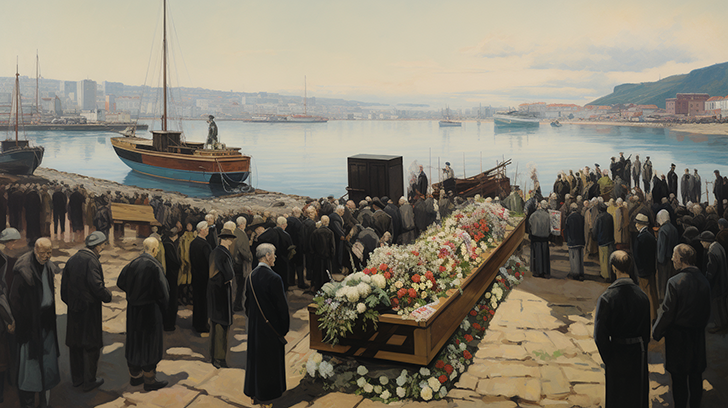- by Tim Thompson
Repatriation When Someone Dies Abroad
Repatriation When Someone Dies Outside the UK
Processing the death of a loved one is an inherently stressful ordeal, when it occurs abroad and you would like to understand the process, the situation can appear even more perplexing. There are important considerations to bear in mind when a British person dies overseas, including the process of repatriation, legal and administrative procedures, bringing the body home, coping with the loss, and understanding the available support and resources.
Understanding the Process of Repatriation
When a British person dies abroad, several essential steps need to be taken to ensure a smooth repatriation process. Firstly, it is crucial to register the death in the country where the person died if travelling abroad, while also requesting the necessary permission to remove the body if desired. This may involve liaising with the local authorities, the British consulate, or the foreign and commonwealth office to complete the necessary documentation and paperwork.
Furthermore, getting a death certificate from the local authorities is a fundamental requirement before repatriation has taken place. This copy of the death certificate from a foreign country will need to be translated and legalized to gain recognition in the UK. Arranging for a body to be brought back to the UK is a complex process that often necessitates the need for an international funeral director or a repatriation service.
Legal and Administrative processes
Obtaining the Death Certificate
After registering the death abroad, it is essential to obtain the foreign death certificate and ensure it meets the legal requirements for repatriation. This may involve working with the local authorities in the country where the death occurred to secure the necessary documentation.
Dealing with Travel Insurance
For those who have travel insurance, it is important to reach out to the insurance provider to understand the coverage for repatriation costs. Some travel insurance policies may offer assistance with the expenses associated with repatriating the body back to the UK. This can be particularly useful when travelling abroad.
Dealing with the Authorities Abroad
Navigating the legal and administrative procedures in a foreign country can be daunting, especially amidst the emotional distress of losing a loved one. Seeking guidance from the British consulate, embassy, or local authorities in the country where the death occurred is crucial to ensure compliance with local regulations and requirements.
Bringing the body home

Once the necessary documentation and administrative procedures are in place, the family and next of kin must decide whether to bury or cremate the deceased abroad or repatriate the body to the UK. This decision may be influenced by personal preferences, cultural and religious beliefs, as well as logistical and financial considerations.
Repatriating the Body to the UK, Repatriation When Someone Dies Abroad
Repatriating the body to the UK involves coordination with the relevant authorities, including the consulate in the country where the death occurred and the UK authorities. Engaging the services of an international funeral director who has experience in repatriation is essential in facilitating the transportation and legal requirements for bringing the deceased back to the UK.
Arranging for a Funeral in Your Home Country
Upon the return of the deceased to the UK, whether the body or ashes, the family can then make arrangements for a funeral service in the UK, whether it is a burial or cremation. In England and Wales, the registration of the death with the UK authorities is mandatory. Working with a local funeral director to organize the funeral service becomes a vital part of the process, furthermore, they can also assist with getting permission to remove the body if needed.
Dealing with the death of a loved one who died abroad presents its own set of challenges. One of the initial steps is to contact the British consulate, embassy, or foreign and commonwealth office.
Upon receiving the heartbreaking news of a relative meeting their end abroad, it may be overwhelming to figure out the initial steps, but the need to contact the relevant authorities should not be overlooked. Liaising with the British consulate or embassy can provide guidance on the necessary steps to take in the foreign country.
Who do you contact first when someone dies?
When confronted with the upsetting news of a dear one’s demise overseas, the primary point of contact should be the British consulate or embassy, or you need to contact the foreign and commonwealth office in the UK. They can provide expert guidance and support during this challenging time, particularly in clarifying what procedures must be held in the UK.
Who should I notify when someone dies?
Upon the death of a loved one abroad, it is essential to notify the local authorities in the country where the person passed away, as well as the British consulate, embassy, or foreign and commonwealth office. These agencies can offer valuable assistance in navigating the legal and administrative procedures, including informing you of everything you need to know about repatriating a deceased loved one back to the UK.
What is the best thing to do when someone passes away?
When someone passes away abroad, the best course of action is to contact the authorities in the country where the death occurred, as well as the relevant British consulate, embassy, or foreign and commonwealth office. Seeking their guidance is essential in ensuring compliance with the necessary procedures for repatriation.
What do I need to do when someone passes away?
When a relative passes away abroad, it is important to promptly notify the local authorities in the country where the death occurred, and then contact the British consulate, embassy, or foreign and commonwealth office. They will offer instructions on the measures to adopt and will support the repatriation of mortal remains to the UK.
Is there an international death certificate?
In the case of a death abroad, an international death certificate may be issued by the foreign authorities. This certificate would need to be translated and legalized to be recognized in the UK.
What happens when a UK citizen dies in another country?
When a UK citizen dies in another country, their family or next of kin should contact the British consulate, embassy, or foreign and commonwealth office for assistance. They can provide guidance on the necessary steps for repatriation and supporting the family during this difficult time.
What happens if you die in a foreign country?
If an individual dies in a foreign country, it is important for their family or next of kin to contact the local authorities and also seek guidance from the British consulate, embassy, or foreign and commonwealth office. They can give support in navigating the procedures for repatriation including all the permissions and documents you will need to bring the body or ashes home from abroad.
What happens when a relative dies overseas?
When a relative dies overseas, it is essential to notify the local authorities in the country where the death occurred and then reach out to the British consulate, embassy, or foreign and commonwealth office. They can provide guidance on repatriation procedures, offer support to the family, and help with everything you need to know when it comes to bringing the body or ashes home from abroad.
What happens if a Brit dies in Spain?
If a British citizen dies in Spain, it is crucial to contact the British consulate, embassy, or foreign and commonwealth office for assistance, including registering the death with the British authorities and learning more about the burial abroad procedures. They can support the family in the repatriation process and provide guidance on the legal and administrative procedures.
Does travel insurance include death?
When dealing with the unfortunate event of a loved one dying abroad, it’s crucial you find out what you need namely, to consult the travel insurance provider to understand the coverage for cremation or repatriation expenses. Some travel insurance policies may include assistance with the expenses associated with repatriating the deceased back to the UK.
What happens when someone dies abroad on holiday?
In the unfortunate event of someone passing away abroad while on holiday, it is crucial to notify the local authorities in the country where the death occurred and seek assistance from the British consulate, embassy, or foreign and commonwealth office for guidance on the necessary procedures for repatriation.
What happens if someone dies in a different country?
If someone dies in a different country, their family or next of kin should promptly notify the local authorities in the country where the death occurred and then reach out to the British consulate, embassy, or foreign and commonwealth office for support and guidance in the repatriation process.
What happens if someone dies while Travelling?
If someone dies while travelling, their family or next of kin should contact the relevant authorities in the country where the death occurred, and also seek guidance from the British consulate, embassy, or foreign and commonwealth office on the necessary procedures for repatriation and support during this challenging time.
what happens if someone dies in another country
If someone dies in another country, their family or next of kin should first notify the local authorities in the country where the death occurred, and then contact the British consulate, embassy, or foreign and commonwealth office for assistance in navigating the repatriation process.
what to do when a relative dies abroad
When a relative dies abroad, it is essential to notify the local authorities in the country where the death occurred, and then reach out to the British consulate, embassy, or foreign and commonwealth office for guidance and support in the repatriation process.
what happens when someone dies abroad
When someone dies abroad, it’s essential to find out what you need such as navigating the legal procedures, considering repatriation options, and deciding whether you need an international funeral director. This involves registering the death, obtaining a foreign death certificate, and planning for the body’s repatriation.
what do you do when someone dies abroad?
If someone dies abroad, contact the British consulate, embassy, or foreign and commonwealth office for guidance on repatriation procedures and support during this challenging time.
what happens when someone dies abroad on holiday
In the unfortunate event of someone passing away abroad on holiday, it is crucial to notify the local authorities in the country where the death occurred and seek assistance from the British consulate, embassy, or foreign and commonwealth office for guidance on the necessary procedures for repatriation.
what to do when someone dies abroad
When a relative dies abroad, it is essential to notify the local authorities in the country where the death occurred and then reach out to the British consulate, embassy, or foreign and commonwealth office for guidance and support in the repatriation process.
what to do if a person dies abroad
If a person dies abroad, the first point of contact should be the British consulate, embassy, or foreign and commonwealth office. They can provide guidance and support during this difficult time, including navigating all the necessary steps for bringing a body or ashes home from abroad.
what to do if someone dies abroad
Dealing with the death of a loved one abroad presents its own set of challenges. One of the initial steps is to contact the British consulate, embassy, or foreign and commonwealth office.
Can you bring the body or ashes to England and Wales if someone dies abroad?
Yes, the body or ashes can be brought to England and Wales if someone dies abroad, but this involves complex legal, administrative, and repatriation procedures.
Do you need to register the death of a British citizen abroad in England and Wales?
Yes, it is necessary to register a death abroad, particularly if a British citizen dies abroad, both in England and Wales. This involves complying with local legal requirements and then registering the death with the UK authorities.
Has someone died abroad?
If someone has died abroad, it is important to notify the local authorities in the country where the death occurred and then contact the British consulate, embassy, or foreign and commonwealth office for assistance in navigating the repatriation process.
How long does it take to repatriate a body?
The process of bringing a body back to the UK can vary in the time it takes, depending on the specific circumstances, legal requirements, and administrative processes involved once repatriation has taken place.
How much does cremation cost abroad?
The cost of cremation abroad can vary widely depending on the country, local regulations, and the specific services and arrangements chosen by the family or next of kin.
How much does it cost to repatriate a body abroad?
Repatriating a body abroad can incur significant costs, including transportation, legal requirements, administrative fees, and the services of an international funeral director or a repatriation service.
What do you do when someone dies abroad and you’re not with them?
If someone dies abroad and you’re not with them, it’s important to contact the British consulate, embassy, or foreign and commonwealth office as soon as possible for guidance and support in navigating the repatriation process.
What do you do when someone dies abroad and you’re with them?
If you’re with someone when they die abroad, the first step is to notify the local authorities in the country where the death occurred and then seek guidance and support from the British consulate, embassy, or foreign and commonwealth office.
What is body repatriation?
Body repatriation, also known as repatriation, involves the process of bringing a deceased person’s body back to their home country. This can include legal, administrative, and logistical procedures to facilitate the transportation and burial or cremation arrangements. This information will guide you through understanding the process and steps to be taken if someone dies abroad, offering essential support and resources for the repatriation process.
Frequently asked questions about Repatriation When Someone Dies Abroad
What initial steps do I need to take if a person who died was a friend who dies abroad?
The first step is to contact the nearest British Embassy, High Commission or Consulate. They can provide you with assistance and inform you about the legal procedures in the country where the death occurred. You may also need to inform the person’s next of kin or a designated contact person about the death of someone else. If the person who died had travel insurance, notify the insurance company as soon as possible as they might be able to help with the logistics and costs.
How do I register a death that has occurred abroad?
The process may vary depending on the country. Generally, you need to register the death according to the local law and get permission to remove the body, and you might need to do so in the local language, which can be somewhat challenging when you are abroad. You might also register the death in the UK at the local register office or the General Register Office. In some cases, you may also be able to report a death abroad to the British Consulate in the country where the person has died.
When should a local death certificate be obtained and why is it important?
The local death certificate should be obtained as soon as possible after the death occurred; it will be essential for getting permission to remove the body or ashes and is typically used in the UK for settling the deceased’s estate. It holds importance as it is often required to organize a funeral, for legal negotiations, and when you need to register a death abroad. The document should also be requested in English, or an English translation of the foreign death certificate may be required for proceedings in the UK.
What do I need to know if I want to arrange a funeral abroad?
Arranging a funeral abroad may be influenced by local customs, regulations and practical constraints. Therefore, it is recommended to seek help from an international funeral director who is familiar with the procedures in the country where the person died. Do note, that the body can be buried or cremated abroad, depending on your preferences and the wishes of the person who has died.
What steps should I take to bring the body home for a funeral in the UK after a death abroad?
Usually, an international funeral director can help with the process of arranging the repatriation. You need to apply for a death certificate from the country where the death occurred. This document is commonly used in the UK to handle the deceased’s affairs. In some cases, you may need to get permission from a coroner to remove the body and have it sent back to the UK.
What is the role of the coroner in the event of a death abroad?
When a body is returned to the UK, a coroner is responsible for investigating the cause of death if it was violent, unnatural, or the cause remains unknown after post-mortem examination in the foreign country. The coroner might carry out a post-mortem investigation or inquest in the UK.
Are the causes of death reported differently when someone dies abroad?
Yes, the cause of death may be reported differently depending on the country’s practices. In some countries, they might not perform an autopsy, or their techniques may differ, hence, you may need an international funeral director to guide you through the process. Therefore, it can be helpful to discuss this with the British embassy or consulate as they may be able to provide guidance or translation services.
What should I do if the person who died abroad did not have any travel insurance?
In such a case, the costs of returning the body to the UK must be met by the family. Should the family be unable to afford cremation or repatriation expenses, they may be eligible to apply for government financial assistance. Always consult with your contact at the development office or local British embassy for advice on the best course of action to get a death certificate and understand what procedures need to be held in the UK.
Do I need a UK inquest if the death occurred abroad?
It depends on the circumstances of the death, for instance, whether you plan to organise a funeral service in the UK or opt for a burial abroad. In most cases, when the body is repatriated, a UK coroner will usually conduct an inquest if the death was sudden, unexplained, or due to unnatural causes.
Can I get help from the British embassy to arrange a funeral abroad?
The British Embassy, High Commission or Consulate can provide guidance and assist in understanding the local laws and procedures. However, they cannot make funeral arrangements or cover costs. That is typically the responsibility of the family or next of kin.











